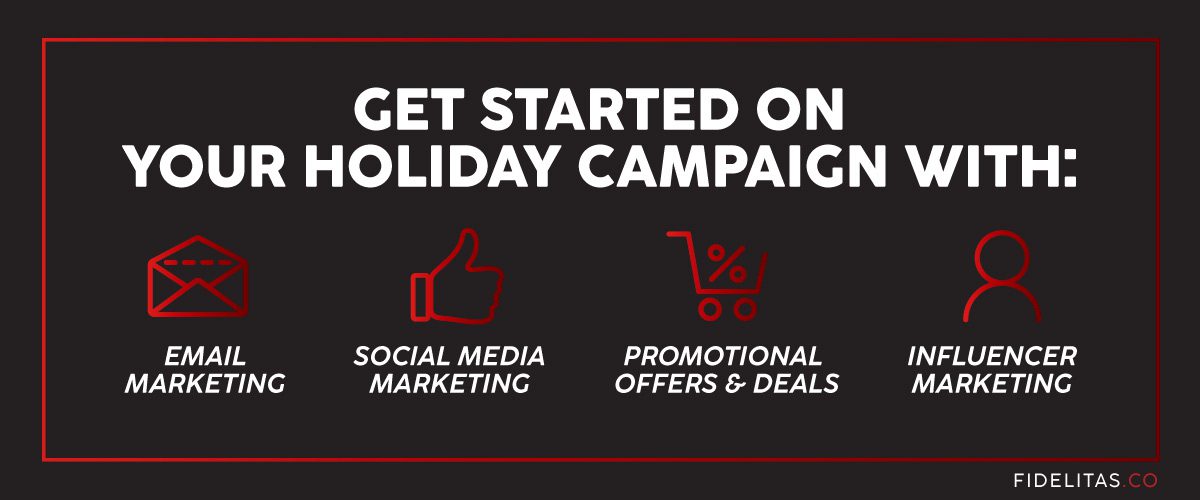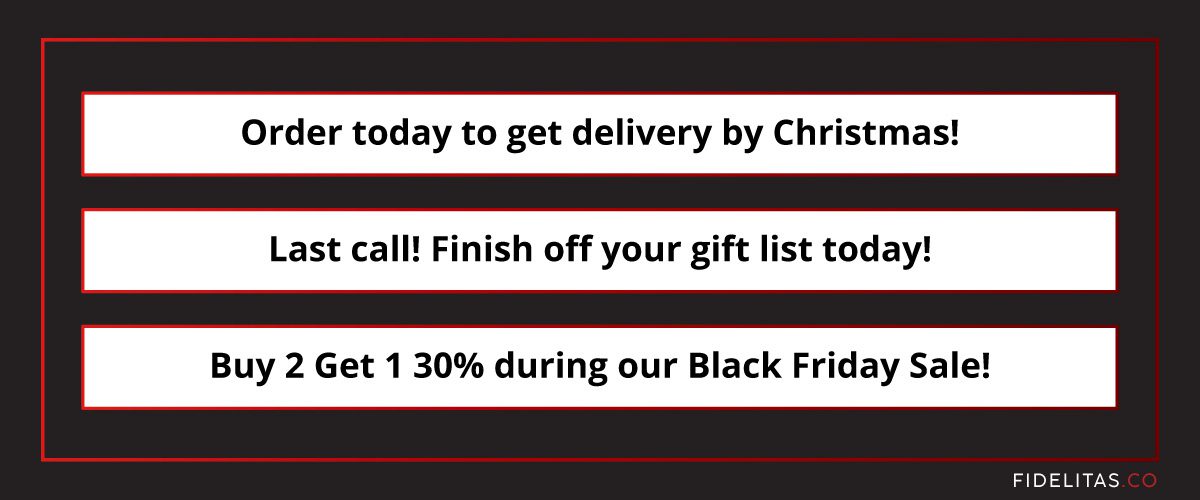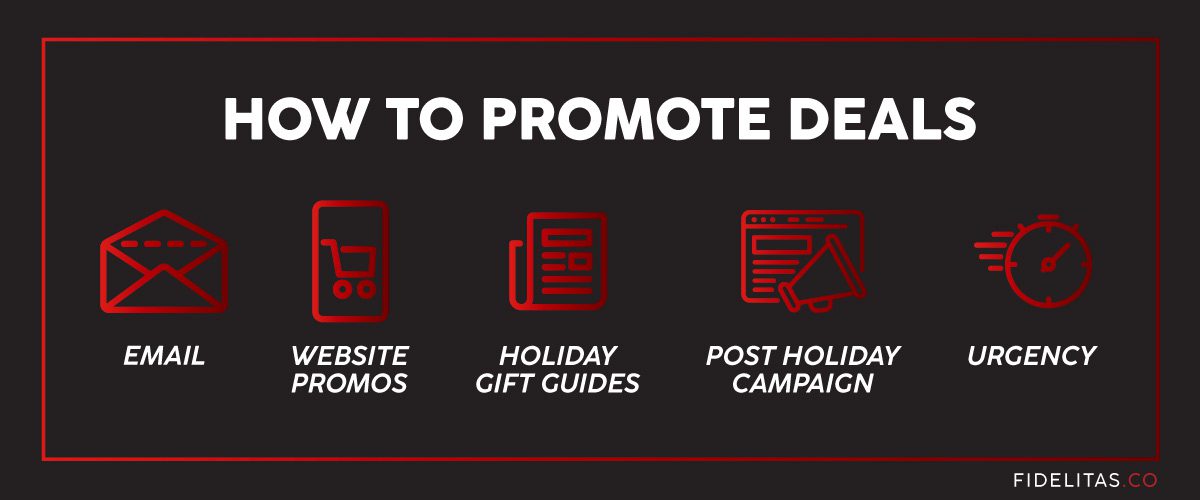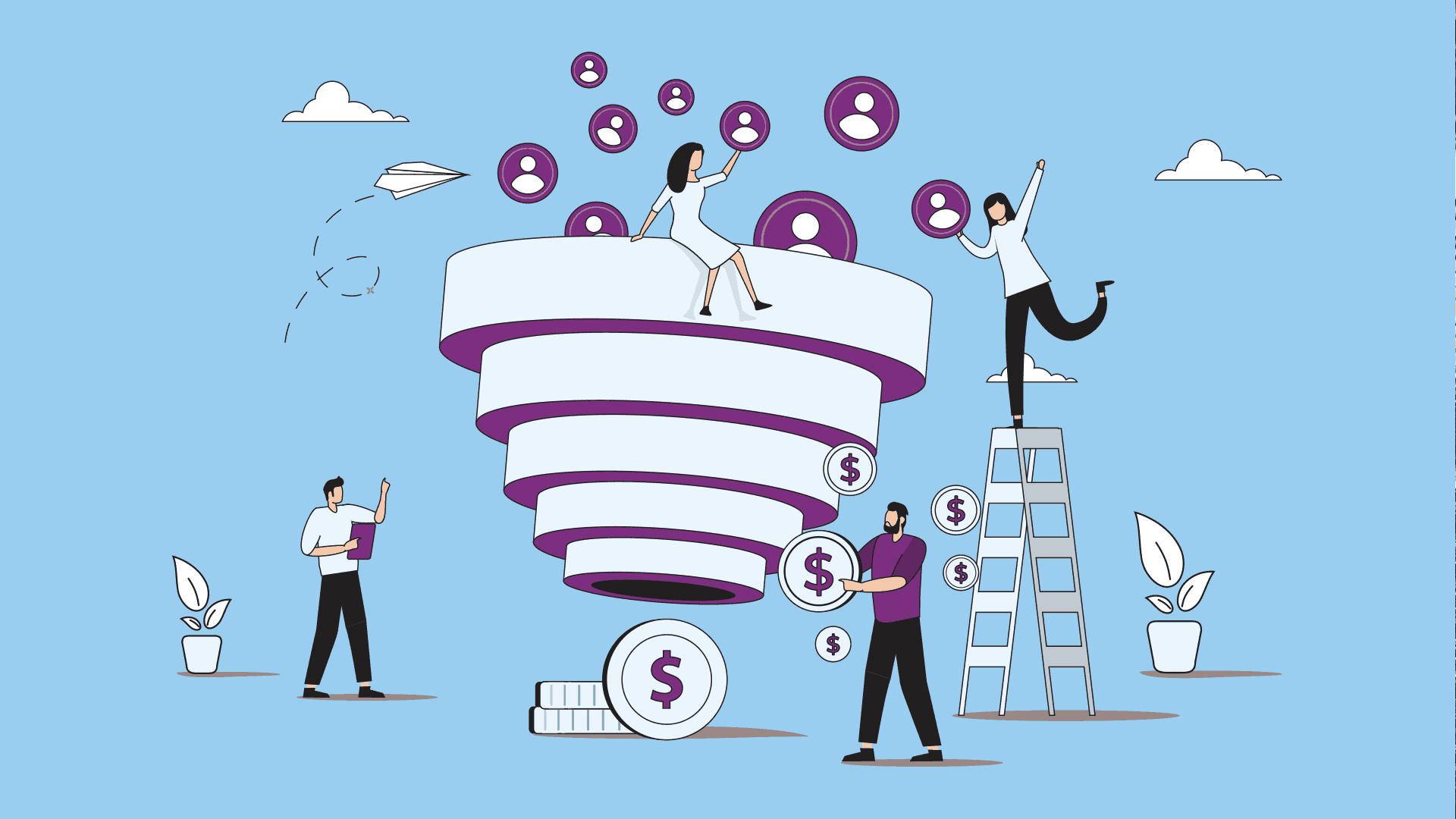What is a Holiday E-commerce Campaign?
When the winter holidays roll around, you see holiday ads everywhere and all over the internet. Holiday e-commerce campaigns help businesses thrive during the busiest and most combative shopping season. The winter holiday season gives businesses a great opportunity to drive sales and increase brand awareness; however, a lot of planning goes into creating a holiday e-commerce campaign, so it’s best to plan early.
Why it’s Important?
Consumers shop the most during major holidays such as Black Friday, Cyber Monday, and Christmas. According to the National Retail Federation (NRF), consumers start shopping for the holidays as early as Halloween, and 65% will plan to shop post-Christmas. Another reason why holiday campaigns are important is that online shopping is becoming more popular. From 2019 to 2021, online was the most common shopping destination according to NRF’s December 2021 Consumer Holiday Survey. Consumers expect businesses to offer deals and promotions around the holidays. For this reason, holiday campaigns are extremely important for driving sales and building & maintaining relationships with customers.
How to Plan for it:
You need to use the right tools to promote your business effectively. It is the busiest shopping season and the most competitive time for businesses. There are many factors to consider when planning a holiday campaign (target audience, how long you want your campaign to last, comparison to past campaigns, etc.) so it’s best to plan ahead.

1. Email Marketing
Email marketing is one of the most powerful tools you can use to increase sales and brand awareness. When users sign up for your email list, they are giving you permission to contact them directly with deals and savings. Don’t take this direct line of communication for granted. Use it to keep your customers coming back for more.
How to Use Email Marketing for a Holiday Campaign:
The holiday season starts ramping up at the end of August, and we’re not talking about the re-emergence of Halloween decorations onto retail store shelves. The real ramp-up that we start seeing right around Labor Day actually comes from paid advertising costs. The average CPC on Facebook rises to around $1.20, and the average CPM reaches around $17.
Email marketing gives you an opportunity to drive revenue without paying these exorbitant paid ad fees. You can take your sales directly to your customers without having to rely on middlemen like Facebook and Instagram to drive the entirety of your holiday sales.
Subject Line: An email’s subject line and preview line are extremely important, as this is the first thing the subscriber will see. It will determine whether or not the email is worth opening. Engaging subject lines are always going to outperform those that are banal.
Here are a few examples to get you started:

“Order today to get delivery by Christmas!”
“Last call! Finish off your gift list today!”
“Buy 2 Get 1 30% during our Black Friday Sale!”
CTA: Emails should contain a clear and concise call to action (CTA). Consumers know holidays have a deadline and how busy the holiday season is–– you can use that to create a sense of urgency by letting them know an offer is for a limited time or letting them know something is low in stock. Make sure to include multiple strategically placed CTAs throughout your email to increase the likelihood of engagement.
Personalized: Send subscribers emails with offers they can’t get anywhere else. For example, your site may have “Free Shipping,” but you can still send special offers to subscribers that they won’t find on your website. This is something unique about e-commerce since most brick-and-mortar stores can’t engage every customer that walks through their door on a personal level. Adding other personalization features, like addressing the user by name or sending curated gift guides based on their interests, are easy ways to make customers feel like they’re more than just a number on a sales sheet.
Eye-Catching Visuals: You might be the most talented writer in the world, but if you send your subscribers a giant wall of text or include dull, boring, or poor-quality images, you’re going to instantly turn them off from clicking through to your store.
Short and Sweet: Get to the point! You only have a few precious seconds to convince your email subscribers to make a purchase. Don’t beat around the bush. Be clear, concise, and to the point.
What are the Benefits of Email Marketing?
Cost-effective: Email marketing is one of the most common and least expensive marketing methods. It’s also one of the highest ROI marketing strategies; every $1 you spend on email marketing brings in an ROI of $36 on average.
Additionally, the cost of email marketing is much easier to calculate because the cost of social media marketing fluctuates depending on the season and level of competition. The more advertisers compete for a spot, the more your Facebook ad will cost. On average, companies can expect to pay about $0.94 per click or $12.07 per 1,000 impressions for Facebook ad placements, and these costs increase during Black Friday and Christmas shopping season.
But with an email marketing platform such as Klaviyo, the out-of-pocket cost scales with your contact list, so you don’t have to worry about trying to outspend your competitors.
Relevance: Unlike social media marketing, people on your email list are already interested in your brand. With social media, you can wind up paying for people to see your ads and they may never actually interact with you. Email marketing allows you to deliver your message to a relevant audience that has already consented to receive emails from you.
Reach: Reach a large number of recipients in no time. It’s quick and efficient. For example, on Facebook, two brands in the same market with the same target audience will have to compete in an ad auction. To determine whose ad gets shown, Facebook’s algorithm determines which ad will get the most engagement. A customer that is interested in your brand might not always see your ad; however, via email, they can. Thankfully, email marketing allows direct communication with your customers––that’s why it’s so important.
2. Social Media Marketing

Over its two-decade lifespan, social media has become the largest marketing medium in the world. Not only does it give you a more direct line of communication with your customers than traditional marketing, but it also puts them all in one general space so you don’t have to go through various magazine publishers or cable tv channels to reach your audience in different locations. All your potential customers are using the same select few platforms, and all you need is some killer content to get them to convert.
Which Social Media Platform is Best for Your Campaign?
Facebook, Instagram, and Twitter have become the de facto social media marketing platforms. They’re established, provide a wide reach, and are fairly intuitive to use.
Of all the major platforms Facebook and Instagram garner the most users. However, it would be foolish to write off other platforms like LinkedIn, Youtube, and TikTok since 61%, 55%, and 9% of business owners promote their businesses on said social media platforms respectively.
So how do you determine which social media platform to promote your business? The rule of thumb should be to follow your audience.
If your target audience is primarily made up of Younger Millennials, Gen Z, and/or Gen Alpha, then TikTok and Instagram are probably going to get you the widest reach.
If your audience is mostly Gen X or Baby Boomers, then Facebook is likely to be their platform of choice.
Of course, these are generalizations. The type of business you run should also be taken into account when choosing where to focus your efforts. Craft-centric businesses are likely to find varying degrees of success on Pinterest. If you’re in the consumer tech sphere, then YouTube will provide some great influencer opportunities.
Maintain a presence across any social media platforms that seem beneficial to your business, but do some demographic research to figure out where the bulk of your time, effort, and marketing budget should be spent. Our latest blog on social media user statistics has all the information you need to get started with your demographic research.
What are the Benefits of Social Media Marketing?
There are numerous reasons that you should be promoting your holiday deals on social media, but if you only remember one thing from this section let it be this: on average, Americans spent 3.5 hours a day on social media in 2020.
Call it a fluke. Blame the pandemic. It doesn’t matter.
Americans are spending nearly 1/4th of their waking hours on social media. Meaning you have an unprecedented number of opportunities to get your sales in front of them.

Increase Brand Awareness: Unlike organic email marketing, social media marketing brings in new customers and spreads brand awareness. The people who see your ads don’t have to be following your Social Media pages, and about 55% of consumers learn about new brands via social media. Social media marketing allows businesses to spread awareness on a larger scale than other mediums, but that wide reach does come at a cost.
Maintain and Build Customer Relationships: Social media allows businesses and consumers to communicate with each other. Whether customers praise a product/service or report a complaint, many have done so via direct message or in the comment section. This allows businesses to respond and potentially create a positive experience for the customer. When consumers have a positive experience with a business, they are more likely to purchase again. Don’t treat customers as a one-time transaction.
Gain Insight into Consumers: Observe and analyze your audience. Who are your followers? What are they saying? Which posts do they like more? Engaging with customers and reading comment sections helps you understand your audience better. Instagram has a feature that allows you to create polls or ask followers for their opinions. This interactiveness that comes with social media is very beneficial for marketers and can prove to be a useful tool when used strategically.
3. Promotional Offers and Deals
Christmas and discounts go hand in hand. The holiday of giving drives hundreds of billions of dollars in sales each year, and consumers have an underlying expectation that they’ll find good deals for the holidays. Whether it’s Black Friday sales or After-Christmas specials, consumers love a good holiday promo.
How to Promote Deals
Email: Send subscribers special holiday offers that they can’t get anywhere else, including personalized offers that are specifically for that subscriber.
Website Promos: Promote special deals on your website, such as “Free Shipping”, “Spend $50 or more to get Free Shipping”, etc. You can even offer a “free gift” for orders over a certain amount!
Holiday Gift Guides: Remember going to the gas station after Thanksgiving to pick up the giant newspaper that contained all the Black Friday promos? This is basically the digital version of that. Make a digital flyer or landing page that showcases all of your top products and best deals. You can even use your gift guide to drive email list subscriptions by making it exclusive to subscribers. Once someone signs up for your list, send them the gift guide.
Post Holiday Campaign: How long do you want the campaign to last? Extending deals is excellent for a post-holiday campaign. This is something you can mention in emails and give subscribers a second chance to take advantage of a deal!
Urgency: There are many ways to promote urgency and scarcity. You can create a deadline, use countdowns, and remind your customers that time is running out or that they might not have another chance to take advantage of the deal. But be honest with your customers; if you have lots of stock, don’t create a false sense of scarcity. On the other hand, if an item is in-demand and could run out then make sure you warn them!
4. Using Influencer Marketing For Holiday Campaigns
If you don’t already know by now, influencers are minor celebrities that have become famous for their content creation. Influencer marketing is when an influencer promotes the product or service of the brand they partner up with. Influencers have a sizable following which gives them a certain amount of social influence on their followers. They often promote brands on social platforms like Instagram and TikTok.
Before you look for an influencer, there are important things to consider, such as reputation, audience, brand history, and cost. Of course, it would be beneficial to have a very popular influencer to promote your brand; but for small businesses, that can be a difficult task when you consider the cost. There are different categories of influencers based on their following: Macro Influencers (500k-1M or more), Mid-tier Influencers (50k-500k), and Micro Influencers (1-10k and 10-50k).
Learn everything you need to know about influencer marketing in our recent blog!
Alternatives:
You don’t need to have an influencer to promote your brand. Sometimes your customers are your biggest and most influential promoters. If they tag you in a post praising your product/service, reshare that post. If they’re commenting on your videos and tagging friends, engage with them. Make your customers feel important and they’ll become your biggest cheerleaders.
Start Planning Your Holiday Campaign
If you haven’t started your holiday campaign yet, then you’re running out of time. If you don’t have your digital marketing chops yet, then working with an experienced team can make all the difference. Fidelitas has been in the digital marketing game for 15 years, and our team is ready to help you execute your holiday eCommerce campaign.
Contact Fidelitas today to learn how we can help you win this holiday season.








More Stories
Retail Tax Franchises or Online Tax Software?
Franchising – A Retirement Plan Or Prison Sentence?
Why Do We Need Computer Training?